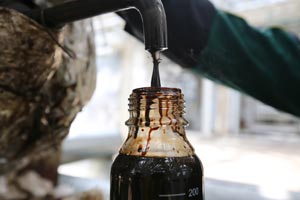Oil Falls to Below $40 a Barrel for First Time Since April

Oil fell below $40 a barrel for first time since April, falling into a bear market on concern that the global supply glut will expand.
Saudi Arabia cut prices to Asian customers as the country continues to fight for market share. Drillers in the United States boosted the number of rigs seeking oil for a fifth week, the longest run of gains since last August, according to data from Baker Hughes Inc. U.S. crude and gasoline supplies are at the highest seasonal level in at least two decades. West Texas Intermediate settled 22% below its June peak Aug. 1, meeting the common definition of a bear market.
"We got here on the back of excessive storage in crude oil and gasoline," said Bob Yawger, director of the futures division at Mizuho Securities USA Inc. in New York. "The storage levels are so out of whack."
Oil has tumbled from its recent peak in early June, ending a recovery that saw prices almost double from a 12-year low in February. The persistence of the supply overhang is upsetting industry expectations, with BP, Royal Dutch Shell and Exxon Mobil Corp. reporting second-quarter earnings last week that were worse than estimated.
WTI for September delivery dropped 3.7% on Aug. 1 to close at $40.06 a barrel on the New York Mercantile Exchange. It also was the first settlement below 200-day moving average since April, adding to the bearish pressure.
State-owned Saudi Arabian Oil Co. said July 31 it will sell cargoes of Arab Light in September at $1.10 a barrel below Asia’s regional benchmark. That is a pricing cut of $1.30 from August, the biggest drop since November, according to data compiled by Bloomberg News.
The U.S. oil drilling rig count climbed by three to 374, the highest level since March, Baker Hughes said July 29. The nation’s crude inventories rose to 521.1 million barrels through July 22, keeping supplies more than 100 million barrels above the five-year average, Energy Information Administration data show.
Demand for crude is set to decline in the next few months. U.S. refineries typically reduce operating rates to perform seasonal maintenance as the summer driving season comes to an end, after the Labor Day holiday in early September.
"I think the market is going down in anticipation that summer is about to come to an end," said Bill O’Grady, chief market strategist at Confluence Investment Management in St. Louis, which oversees $4.9 billion. "There is a very strong historical trend for gasoline consumption to start to trail off once you get to Labor Day."
Libya’s state crude producer is working to resume oil shipments from three ports after a deal was struck to settle payments to local guards. The move may triple production but only after blockades on oil fields that supply the ports are lifted. National Oil Corp. “will now start working” with the unity government to restart exports from the ports of Ras Lanuf, Es Sider and Zueitina, according to an e-mailed NOC statement.
"We have more than ample supply around the world," said Gene McGillian, a senior analyst and broker at Tradition Energy in Stamford, Connecticut. "We’ve lost half of our spring rally."
In other Oil-market news:
• Hedge funds increased their short positions in WTI by 38,897 futures and options combined during the week ended July 26, the biggest gain in data going back to 2006. Brent net-long positions extended their pullback for a seventh week.
• The current downward correction in oil prices will bottom out in the high-$30 range, Societe Generale SA said.

